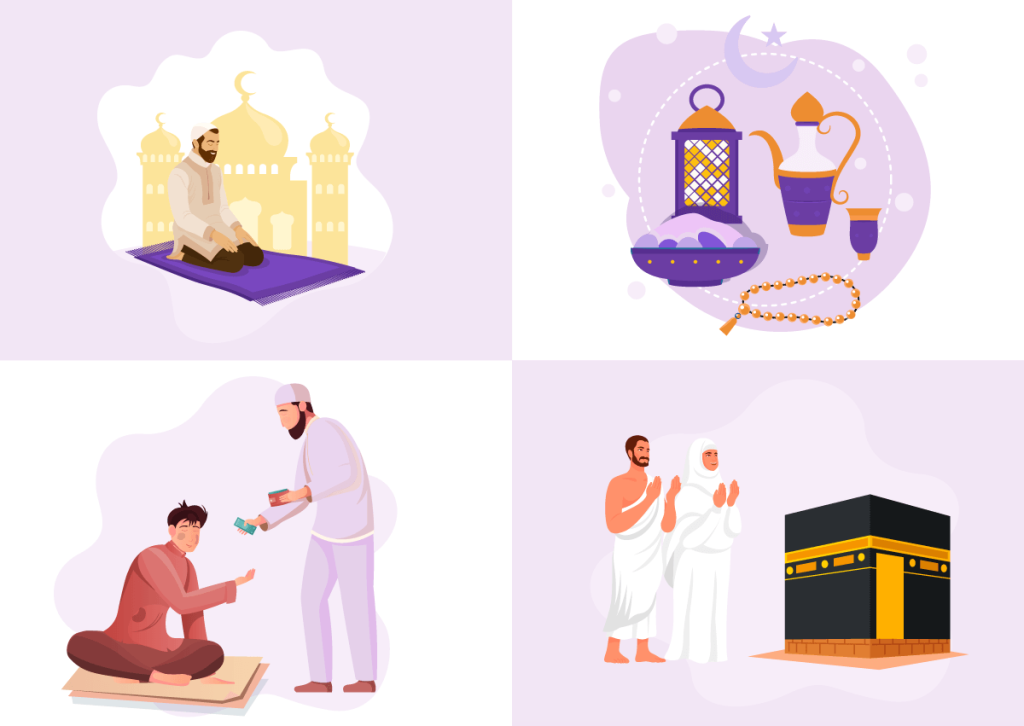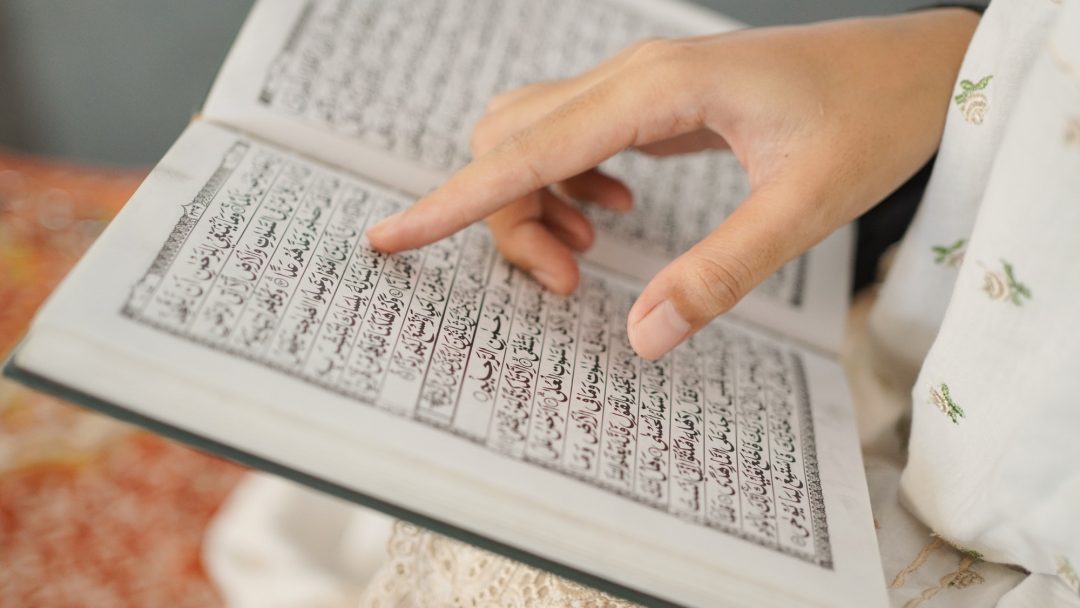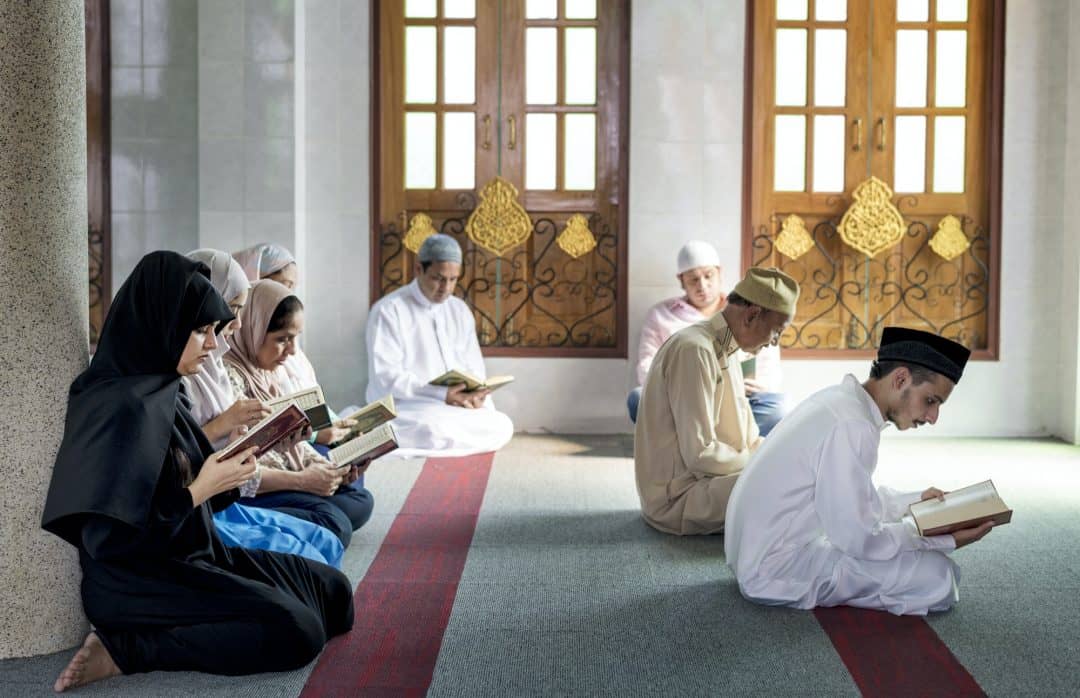Namaz Time :
- Fajr - 04.39 am
- Dhuhr - 11.56 am
- Asr - 03.17 pm
- Magrib - 05.49 pm
- Isha - 07.03 pm
The Five Pillars of Islam are foundational acts of worship: Shahada, Salah, Zakat, Sawm, and Hajj, guiding a Muslim’s faith and practice.

Muslims must pray five times daily to strengthen their connection with Allah. Before dawn (Fajr), at midday (Dhuhr), in the afternoon (Asr), after sunset (Maghrib), and at night (Isha) are the times when these prayers are held. Standing, bowing, and prostrating while reciting passages from the Quran and other mandated prayers are only some physical and vocal actions that make up a prayer.
Islamic teachings on zakat (almsgiving) hold that all wealth is a blessing from God and should be distributed to the poor. Muslims must support the less fortunate by donating a percentage of their wealth, usually between 2.5 and 10% of their cash and possessions. Giving zakat does more than only cleanse the donor’s financial standing; it also fights injustice and improves people’s lives.
Muslims must pray five times daily to strengthen their connection with Allah. Before dawn (Fajr), at midday (Dhuhr), in the afternoon (Asr), after sunset (Maghrib), and at night (Isha) are the times when these prayers are held. Standing, bowing, and prostrating while reciting passages from the Quran and other mandated prayers are only some physical and vocal actions that make up a prayer.
Islamic teachings on zakat (almsgiving) hold that all wealth is a blessing from God and should be distributed to the poor. Muslims must support the less fortunate by donating a percentage of their wealth, usually between 2.5 and 10% of their cash and possessions. Giving zakat does more than only cleanse the donor’s financial standing; it also fights injustice and improves people’s lives.


Muslims fast from sunrise to sunset every day during the holy month of Ramadan. This includes not consuming anything, smoking, or engaging in sexual behaviour when the sun is up. Self-control, spiritual development, and compassion for the less fortunate are all aided by fasting. During this time, Muslims can deepen their connection with God via worship and introspection.
Every adult Muslim who is in good health and has sufficient resources must make the Hajj pilgrimage to Mecca, Saudi Arabia, at least once in their lifetime. During the Islamic month of Dhu al-Hijjah, pilgrims perform the Hajj, which entails a series of rites such as walking around the Kaaba and praying at the plain of Arafat. All Muslim pilgrims wear the same modest white robes and conduct the same ceremonies during the Hajj, which seeks to foster unity, equality, and humility among Muslims.
The Quran is the Islamic holy book, and Muslims consider it Allah’s verbatim revelation to the Prophet Muhammad through the Archangel Gabriel. The Quran is divided into 114 sections (called surahs) that differ in length and scope. For Muslims, it is the final authority on matters of faith and practice, including morality, ethics, and social norms.
Sunnah, which means the words, deeds, and approvals of the Prophet Muhammad, is another primary source of guidance for Muslims. These are collected into books known as Hadith, and they show Muslims how to put the teachings of the Quran into practice.
Sunni and Shia are the two most extensive branches of Islam. After Muhammad’s passing, the Muslim community became deeply divided over who should take over as leader. The vast majority of Muslims are Sunni, while the bulk of Shia Muslims lives in Iran, Iraq, and Lebanon.
God does not look at your appearance and possessions, but He looks at your hearts and deeds.
Prophet Muhammad SAW
Harnessing Quranic wisdom to empower hearts and minds. Join us on a journey of enlightenment and personal growth through profound insights and guidance from the Quran.
Sessions
Availability
Instructors
Students
Lacinia enim mi fames sem nascetur netus proin sodales vulputate sagittis etiam.
Lacinia enim mi fames sem nascetur netus proin sodales vulputate sagittis etiam.
Lacinia enim mi fames sem nascetur netus proin sodales vulputate sagittis etiam.
Lorem ipsum dolor sit amet, consectetur adipiscing elit. Ut elit tellus, luctus nec ullamcorper mattis, pulvinar dapibus leo.
Each class will be of 30 minutes
SCHEDULE PER WEEK | CLASSES PER MONTH | PRICE |
2 Classes /Week | 08 /Month | $39 / Month |
3 Classes /Week | 12 / Month | $53 / Month |
4 Classes /Week | 16 / Month | $69 / Month |
5 Classes /Week | 20 / Month | $85 / Month |
HIFZ CLASSES | 20 / Month | $170 / Month |
SCHEDULE PER WEEK | CLASSES PER MONTH | PRICE |
2 Classes /Week | 08 /Month | $50 / Month |
3 Classes /Week | 12 / Month | $69 / Month |
4 Classes /Week | 16 / Month | $89/ Month |
5 Classes /Week | 20 / Month | $110 / Month |
HIFZ CLASSES | 20 / Month | $221 / Month |
SCHEDULE PER WEEK | CLASSES PER MONTH | PRICE |
2 Classes /Week | 08 /Month | £26 / Month |
3 Classes /Week | 12 / Month | £39 / Month |
4 Classes /Week | 16 / Month | £48 / Month |
5 Classes /Week | 20 / Month | £57 / Month |
HIFZ CLASSES | 20 / Month | £100 / Month |
SCHEDULE PER WEEK | CLASSES PER MONTH | PRICE |
2 Classes /Week | 08 /Month | $40 / Month |
3 Classes /Week | 12 / Month | $60 / Month |
4 Classes /Week | 16 / Month | $80/ Month |
5 Classes /Week | 20 / Month | $100 / Month |
HIFZ CLASSES | 20 / Month | $170 / Month |
To get exclusive content regarding Islamic Education subscribes us
Our Quran Academy experience has taught us that online courses simply require a different type of approach to online Quran learning education.